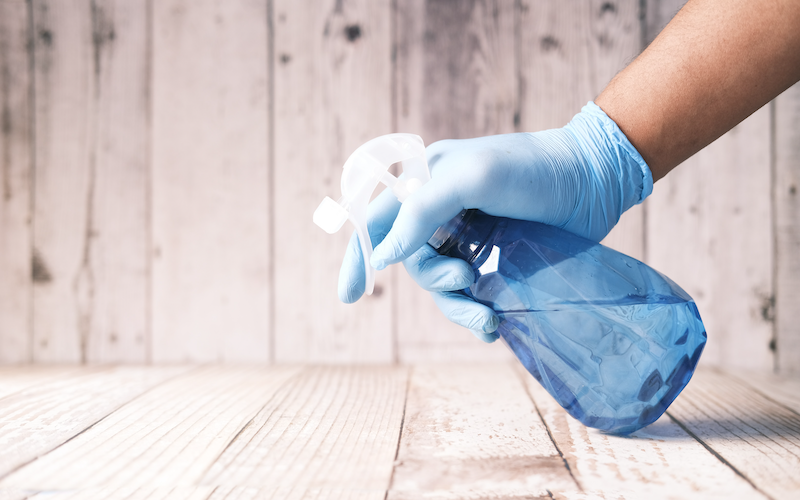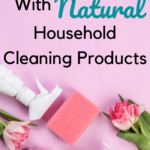
Much has been written on the subject of natural household cleaning products. With environmental allergies being so common in this day and age, converting to natural household cleaning products is worth the investment of both your time and effort.
What many people don’t realize is that the use of natural household cleaning products is often cheaper in the long run than continuing with commercial chemical products.
You may already have many natural cleaning ingredients in your home; it’s just a matter of getting to know what they are and how to use them. Since a lot of natural household cleaning products are also common household items, this can be a great way to save money too. When it comes to making the switch to natural cleaning products, the big question for many is “Where do I start?”
Maybe you’re wondering what you really need to know to make the change to using natural household cleaning products.
Basically, you need to learn what ingredients and tools to use, cautions of using some natural cleaning products, proper cleaning technique, and where to find natural cleaning recipes.
In this article, we’ll cover all of the above plus some of the benefits of transitioning to natural and healthy cleaning products in your home.
The Best Natural Household Cleaning Products
This post contains affiliate links, which means that I may make a commission on purchases and/or clicks (at no extra cost to you).
Basic Cleaning Ingredients
Let’s begin with some of the basic “safer” environmentally-friendly household cleaning products that you likely have at home:
Vinegar
Vinegar is an amazingly versatile and inexpensive natural home cleaning product. It’s effective at killing bacteria, so can be used as a disinfectant.
Just be sure to avoid using vinegar on wood, stone, or any other porous surfaces as the acid can eat away at certain materials and cause damage to these.
Baking Soda
Baking soda is an effective natural deodorizer and abrasive, which makes it useful for cleaning and freshening your home.
You can make it into a paste with water and use it to scrub your kitchen sink or bathroom. You can also sprinkle it on your mattresses or furniture and then vacuum it off to get rid of stale odors.
Check out this list of 50 ways to clean with baking soda for more ideas and you’ll have your house sparkling clean in no time.
Corn Starch
Corn starch is an inexpensive ingredient that can be used for a range of cleaning applications.
It’s a natural and gentle abrasive, making it effective for removing dirt and grime without damaging the underlying surface. It’s also highly absorbent, which is great for deodorizing, absorbing moisture, or sucking up grease.
Hydrogen Peroxide
Hydrogen peroxide is a safe and super effective product for removing stains and sanitizing household items. It’s a natural disinfectant and strong bleach; use in place of bleach to whiten and deodorize your laundry, but avoid using on colored fabrics.
Note: Avoid mixing hydrogen peroxide with vinegar as this will form peracetic acid, which is an irritant and potentially toxic.
Castile Soap
Castile soap is a natural vegetable soap, traditionally made from olive oil from the Castile region of Spain. These days it’s commonly made from coconut oil, hemp oil, avocado oil, or other vegetable-based oils.
Castile soap is all-natural, gentle on the skin, and free from synthetic detergents and animal by-products, making it a great eco-friendly cleaning ingredient. Dr Bronner’s castile soap is one of the most popular brands on the market today.
It’s also incredibly versatile, with uses in every room of the home. Castile soap can be used as a shampoo, face and body wash, hand soap, makeup brush cleaner, laundry detergent, toilet cleaner, and as an ingredient in natural deodorant (to name just a few of it’s many uses).
Other Ingredients To Consider
Additionally, these three ingredients are used by many who implement green cleaning methods, but they do have some risks associated with using them.
If you want to start using any of these three household cleaning products, make sure you do your research and understand the risks so that you can use them safely. They really are great ingredients if you know how to handle them!
Borax
Borax is another super common and versatile home cleaning product. It can be used as a laundry booster to deodorize, remove stains, and keep your whites whiter. It also has a ton of other applications, including use as a pesticide and cleaner, to name a few.
Borax does have some potential risks (it can cause irritation to skin and is toxic to children in small amounts), but is generally considered to be safe as long as you use it responsibly and take appropriate precautions.
Make sure you use gloves when handling borax, only use it in well ventilated areas, and always keep all cleaning products out of reach of children.
Washing Soda
Washing soda is closely related to baking soda, but it is not the same thing and it does have different uses around the home.
Washing soda is a useful water softening agent and powerful natural cleaner. It’s considered to be non-toxic, but is very basic (with a pH of 11) so be sure to wear gloves and when you’re using washing soda, and keep it away from children and pets.
Household Ammonia
Ammonia is a cheap and effective household cleaning product. It is often used as a glass cleaner since it evaporates quickly, and is also useful for removing grease and baked-on grime.
It has a pungent smell, and may cause irritation for anyone with sensitive airways (such as asthma-sufferers), but is generally considered to be safe for the majority of people when used correctly.
Note: Make sure you never mix ammonia with bleach or other types of chlorinated cleaners as this combination will produce a harmful (potentially fatal) gas.
Essential Oils And Citrus
So far we’ve covered some products that have effective cleaning properties for your home, but “What about that fresh smell that I get from traditional household cleaning products?”, you might be wondering.
You’ll be happy to know that there’s a natural and healthy alternative for this too. Citrus fruit like lemons, limes, and oranges are a great ingredient to add a nice scent to your homemade cleaning products.
Another great option is essential oils.
Essential oils can also be used in cleaning, as many have broad-spectrum disinfecting abilities. Many essential oils leave a pleasant scent which can add to your satisfaction of natural cleaning.
Be sure to only use the essential oils to which you and your family do not have any sensitivities, and always use as recommended by the manufacturer.
Some of our favorite essential oils for use in natural household cleaning products include:
Lemon Oil

Peppermint Oil

Tea Tree Oil

If you’re not 100% sure which scent you might like, or if you like a bit of variety, a set of essential oils can be a great place to start.
Once you know which ones you love, you can by them in larger size bottles for a more economical option.
Essential Oils Set

Caution When Using Natural Cleaning Products
Many natural cleaning recipes call for certain combinations of some of the above-listed ingredients.
It’s important to note, that not all “natural” products are considered safe, and that virtually any chemical, when used improperly, poses health risks.
Examples of improper use of chemicals and ingredients are:
- mixing with incompatible ingredients
- mixing in overly large quantities
- mixing in high concentrations
Make sure that before you use any natural household cleaning products that you’re aware of exactly what the product is and how to use it correctly. That way you won’t have any unexpected accidents with your new cleaning routine.
Basic Natural Cleaning Tools And Gear
Cost-effective natural and environmentally-friendly cleaning tools may be more readily available than you think. For instance, check your local grocery or health food stores for these items:
- 100 percent cotton towels – Use these for cleaning household surfaces, then wash and dry before re-using them.
- Natural bristle brush – Great for washing fruits and vegetables.
- Environmentally-friendly sponges – Examples include sea sponges, silicone sponges, or loofahs.
Additionally, you may like to purchase some cotton-lined cleaning gloves to use when handling products such as borax, washing soda or other chemicals. They also keep your hands from drying out when handling wet cleaning cloths.
Spray bottles will also come in handy and are easy to find in both plastic and glass options. Even if they are plastic, if you are reusing them for your natural cleaning products over and over again, you are not contributing to the plastic piling up in landfills.
Some good options include:
Clear Glass Spray Bottles

Amber Glass Spray Bottles

Plastic Spray Bottles

Be sure to label the spray bottles according to the recipe you are using and clean and dry them before refilling for future use. This will help to avoid cross-contamination of the residue from previous mixtures.
Where To Find Natural Cleaning Recipes
The library is a great source for books and DVDs on natural cleaning recipes.
There are also a bunch of websites that can prove helpful in finding the recipes and techniques that fit your needs and lifestyle.
Check out these for some great options:
- The Ultimate Guide to Homemade All-Natural Cleaning Recipes
- 9 Homemade Cleaners That Actually Work, According to Cleaning Experts
- 8 Powerful Homemade Cleaning Products To Clean Your Entire Home
Proper Cleaning Technique
Thorough cleaning is achieved with following these basic steps:
- Remove the surface dirt. After all, how can a disinfectant do it’s job properly with hard and dried food or other substances on the surfaces that you are trying to clean?
- Apply the cleaning solution to the surface you will clean.
- Allow the solution to sit for enough time to clean and disinfect.
- Wipe off the dissolved dirt with a clean towel.
Remember that these steps with a little elbow grease can go a long way to clean effectively.
Final Thoughts
Making the switch to natural household cleaning products is not only beneficial for your health, but a great way to save more money and minimize your environmental impact too. Another great way to reduce your environmental impact is to consider switching to more zero waste products, with these 8 Zero Waste Essentials For Your Kitchen.
We think that everyone should consider moving towards using greener cleaning products.
Hopefully these few tips and natural household cleaning product suggestions will get you started in your journey to a greener and naturally cleaner home.
